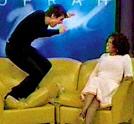Dear Daniel,
Our time together at the Geneva Convention was nothing short of magical… the way we “released international tension together”.. back when you were just a little nameless country called “Jewlandia,” and I a poor naïve Palestine, when the U.N. threw us together in the same convention booth. How did it all go so wrong? When did our Middle East passion become so muddled, all over “that stupid thing with your country being declared at the expense of my country’s autonomy”?
“If only we’d sat down in a Starbucks and written a statement of mutual agreement,” if only we had made a pact that day to never let anything come between us, so much fighting could have been averted. I don’t regret our time together that night, but have regretted every warring moment since, and thought you should know.
Passionately yours,
Suha
The above letter, while a fabrication by this blogger, could easily have been part of the play “The Israeli-Palestinian Conflict: A Romantic Comedy,” an official selection of the New York Fringe Festival. As the play’s title and the above letter indicate (quotation marks indicate direct quotes from the script), the show imagines Israel and Palestine as a man and woman, respectively, who meet and fall in love at the Geneva Convention, only to have their brief union destroyed by the declaration of the State of Israel. As is the case when countries mate, there is post-affair awkwardness, which manifests as regional turmoil and violence. And of course, there are musical numbers.
The play’s fearlessly “out-there” concept–typical of the annual Fringe Festival (which this year also included shows with titles like “Corleone: The Shakespearean Godfather” and “Reservoir Bitches”)–comes courtesy of its Iranian-American birth mother, Negin Farsad, and her partners in writing, Alexander Zalben, and in acting, John Flynn. The show has a madcap, high-energy feel and, if just for a moment, makes us wonder, “Why can’t those two wacky kids work things out?”
When the wacky kids in question are Israel/Daniel and Palestine/Suha, we all know it’s not that simple. But the tropes of relationships gone haywire are surprisingly appropriate. When Suha complains that Daniel “can’t balance a healthy relationship with nation-building,” she needs to find an outlet for her anger. Her epiphany: “I’ll take all the hatred and anger I have and use it constructively to destroy Israel!”
Over the course of the play, the actors get to play with different styles and characters. While some seem a little random (Israel and Palestine do a rap battle! Or a tango! Suha goes on reality show “Blind Date”!) others serve analogies straight up and nuclear.
Farsad plays the petulant student who is also, in the show’s conceit, Iran. She wears a baseball cap and a teenager’s surly and disobedient grimace. She’s called into the principal’s office because he’s found enriched uranium in her locker. “Iran” whines and blame-shifts. “I totally saw Pakistan and India making nuclear warheads under the bleachers during recess…” The principal (playing the role of U.N.) cautions her to wait before launching an attack, reasoning that “waging war is so much better with a standing army that you love.”
Love and war, two areas in which all has been deemed fair. And the line between love and hate is often hard to discern. It takes a rare and inventive imagination to set a region plagued by strife as a romantic musical comedy. If only political unrest and centuries of violence could be erased by a comedy from the fringe.


